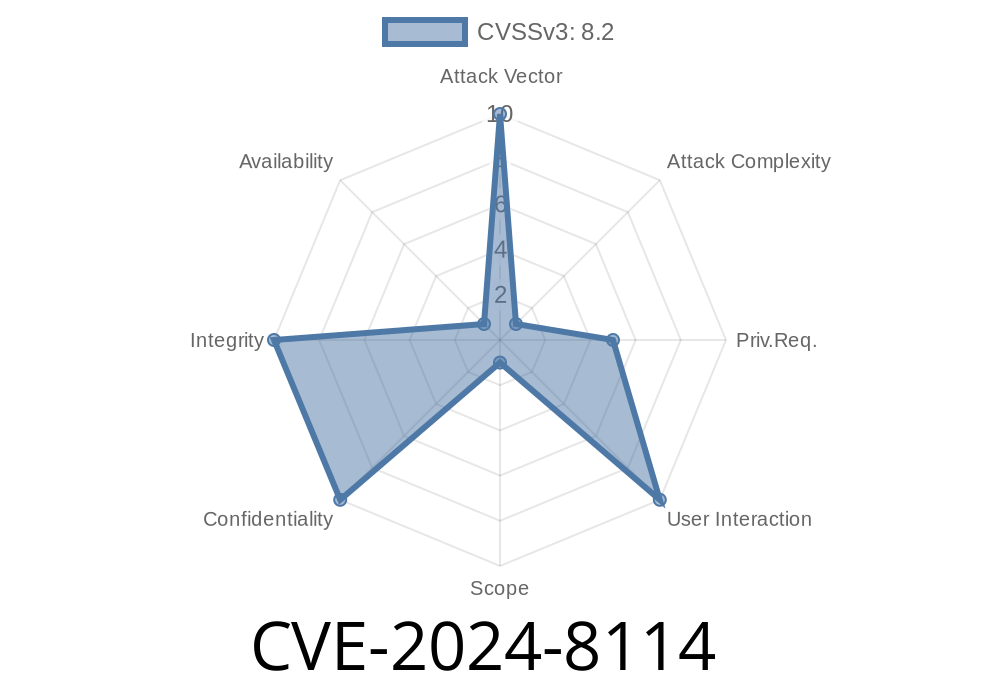In the ongoing mission to make software more secure, vulnerabilities are inevitable in even the most trusted platforms. On June 24, 2024, GitLab issued a security alert for a privilege escalation bug, now known as CVE-2024-8114. This flaw affects all versions from GitLab CE/EE 8.12 up to but not including 17.4.5, as well as 17.5 before 17.5.3, and 17.6 before 17.6.1. If you’re running one of those, your GitLab instance could be at risk—especially if your users’ Personal Access Tokens (PATs) aren’t well-protected.
In this post, I’ll walk you through what CVE-2024-8114 is, how attackers can take advantage, point you to official references, and even break down the exploitation steps. By the end, you’ll know what to look for and how to protect your projects from this serious vulnerability.
What is CVE-2024-8114?
This vulnerability lets a threat actor with access to a victim’s Personal Access Token (PAT) get more permissions than originally intended. Normally, a PAT is scoped to only the operations it was configured for, like read-only access or limited write access. CVE-2024-8114 allows an attacker to escalate privilege—giving them the ability to perform unauthorized actions.
Affected Versions
- GitLab Community Edition (CE) / Enterprise Edition (EE):
17.6 before 17.6.1
For a complete list of fixes, see GitLab's official security release.
Exploit Scenario
Let’s keep it simple: If someone gets hold of your PAT, they can abuse this vulnerability to gain more access than the token should allow. For example, a token with just “read” permissions might be used to trigger destructive or unauthorized write operations.
The root cause is how GitLab was validating and enforcing PAT scopes in these affected versions. In some workflows, the backend failed to properly check or enforce the scope restrictions of the PAT.
Step 1: Phishing or Stealing the PAT
First, the attacker tricks the victim into leaking their token. This could be via phishing, malware, or even pulling a token out of an old CI job log.
Example
# Stolen Token
export GITLAB_PAT="glpat-xxxxxxxxxxxxxxxxxxxx"
Step 2: Abuse the Token via API
With the stolen token, the attacker sends requests to the GitLab API, specifying operations above the permitted scope.
curl -H "Authorization: Bearer $GITLAB_PAT" \
-X POST "https://gitlab.example.com/api/v4/projects/:id/repository/commits"; \
-d '{...}' # Data for creating a commit, even if the token should be read-only
In a vulnerable GitLab version, this might succeed—even though the token isn't supposed to let you write or commit!
Step 3: Privilege Escalation
Now, the attacker might escalate to project-level or group-level permissions, add new deploy keys, or even modify CI/CD variables. All through an initial low-privilege access token.
Mitigations
- Update Immediately: Upgrade to GitLab CE/EE 17.4.5, 17.5.3, or 17.6.1 and later.
- GitLab Release Notes
- Rotate All PATs: Encourage all users to revoke and regenerate their access tokens after upgrading.
Related References
- CVE Record: CVE-2024-8114
- GitLab Security Release Blog
- GitLab Documentation: Personal Access Tokens
Conclusion
CVE-2024-8114 is a textbook example of why strong token management and timely updates are vital. If an attacker can compromise a user's token, the effects can snowball due to this privilege escalation flaw. The GitLab team acted fast to release a fix, and so should you—patch your instance and rotate those tokens ASAP!
Stay safe, keep updating, and always audit your access controls.
*This post is exclusive content for educational and awareness purposes. Protect your code, protect your tokens!*
Timeline
Published on: 11/26/2024 19:15:31 UTC
